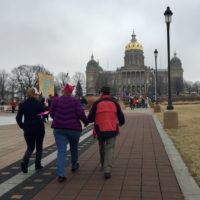Settle, Create & Play. Then Grow
Americans, including Europeans, fled violence, plague and starvation. They were willing to leave the only world they knew and make the arduous journey to a place they could barely imagine. Think about moving to Mars!
 We’re all bombarded every day with big problems and potential solutions. It can be overwhelming! At Next Step we believe in a mindful approach to social action.
We’re all bombarded every day with big problems and potential solutions. It can be overwhelming! At Next Step we believe in a mindful approach to social action.—Margaret Mead
Americans, including Europeans, fled violence, plague and starvation. They were willing to leave the only world they knew and make the arduous journey to a place they could barely imagine. Think about moving to Mars!
There aren’t many things I like better than food. It’s key to good health (eat your veggies). It’s fun to eat (ice cream? popcorn?). There’s nothing more satisfying than baking a loaf of bread or cooking up a tasty stew!
…a sense of belonging is one of the most essential needs of humans. We also need to feel power over our lives, belief in our own abilities and a sense of generosity. Seems to me Covid has challenged our ability to satisfy all of those needs.
Join us for our “Zoom Workshops” to support the belief that Black Lives Matter. We’ll study the issues, as well as routes to action. We’re starting with voting rights because we want to make sure we make our votes count in this critical election.
We may not change the world overnight, but we can read and learn about White privilege, join marches and protests. Support the Black people at the heart of the movement, and step back to remember it’s not about us.
New resources for exploring fruits and veggies, along with some nuggets for appreciating the farmers, truckers, grocery clerks, parents, and all the others who bring them to our table.
Journaling works best with prompts and structure. Use the five activities in this post to reflect on how times are changing, feelings about those changes, and what you’re doing differently.
A photographer that inspires people to save endangered animals and their habitat. Watching him is fascinating. Look up species near you! Learn what you can do to help the earth!
Pay and value are twined together very tightly together in today’s world. We need to VALUE domestic work; I think that’s what I’m learning from my adventures in keeping my own house clean and taking care of June. It’s simple but not easy.
Use this award-winning picture book to help young kids talk about the serious issues we face in our communities. “Sometimes when you’re surrounded by dirt, CJ, you’re a better witness for what is beautiful.”